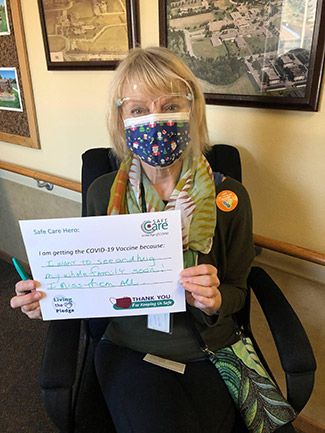This information is also available as a PDF for you to print.
You may also be interested in a letter our medical director sent to all residents.
When will vaccines be available on campus and who is eligible to receive them?
Residents in the care center, assisted living and those open to home care services are eligible to receive a vaccine through NRC. If you are contemplating moving to our facilities we encourage you to do so soon so that you may be included in the next round of vaccinations as a member of the NRC family.
Vaccinations will be administered in the care center on February 1 and March 1. For assisted living and those open to home care services, vaccinations will be administered February 11 and March 11.
How do we know if COVID-19 vaccines are safe?
COVID-19 vaccines were tested in large clinical trials to make sure they meet safety standards. Many people were recruited to participate in these trials to see how the vaccines offer protection to people of different ages, races and ethnicities, as well as those with different medical conditions.
The Food and Drug Administration (FDA) carefully reviews all safety data from clinical trials. Emergency vaccine use is approved only when the expected benefits outweigh potential risks. Additionally, the CDC’s Advisory Committee on Immunization Practices (ACIP) reviewed safety
data before recommending any vaccine for use.
Have these vaccines been tested in people like me?
The first two mRNA vaccines in line for FDA authorization (often referred to by the names of their manufacturer, the Pfizer and Moderna vaccines) were tested in a diverse group of people. About 30% of U.S. participants were Hispanic, African American, Asian or Native American. About half were older adults. There were no significant safety concerns identified in these or any other groups.
Is it better to get natural immunity rather than immunity from vaccines?
Both this disease and the vaccine are new. We don’t know how long protection lasts for those who get infected or those who are vaccinated. What we do know is that COVID-19 has caused very serious illness and death for a lot of people, and especially seniors. If you get COVID-19, you also risk giving it to loved ones who may get sick. Getting a COVID-19 vaccine is a safer choice.
Will the shot hurt? Will it make me sick? What about the side effects?
Most people do not have serious problems after getting a vaccine and the shot will feel like any other injection. We will understand more about mild side effects of the COVID-19 vaccine before we start to use it. However, your arm may be sore, red or warm to the touch. These symptoms usually go away on their own within a week. Some people report getting a headache, fever, fatigue or body aches after getting a vaccine. These side effects, including fever, are signs that your immune system is doing exactly what it is supposed to do. It is working and building up protection to disease. Side effects are particularly common after the second dose. These may be confused with COVID-19 or flu symptoms, but that is not the case. Side effects indicate a good immune response and are generally short-lived. Of course, the staff at NRC will be here to answer questions and provide support for any side effects you may experience. You cannot
get COVID-19 from the vaccine.
How do we know these vaccines are safe when they are so new? What about long-term side effects?
COVID-19 vaccines are being tested in large clinical trials to learn more about their safety and effectiveness. However, it does take time and more people getting vaccinated before we can learn about very rare or long-term side effects. That is why safety monitoring will continue. CDC has an independent group of experts that reviews all the safety data as they come in and provides regular safety updates. Any possible problems will be quickly investigated to find out if the issue is related to the COVID-19 vaccine and determine the best course of action.
How many doses are needed and why?
Nearly all COVID-19 vaccines being studied in the United States require two shots. The first shot starts building protection, but everyone has to come back a few weeks later for the second one to get the most protection the vaccine can offer. Conveniently, both rounds of shots will be provided right here on the NRC campus and we will help everyone get both shots at the appropriate time. It is important to return for your second dose, even if the first dose has unpleasant side effects. Because vaccines may differ in the number of doses needed we don’t yet know the exact spacing that will be required between doses.

